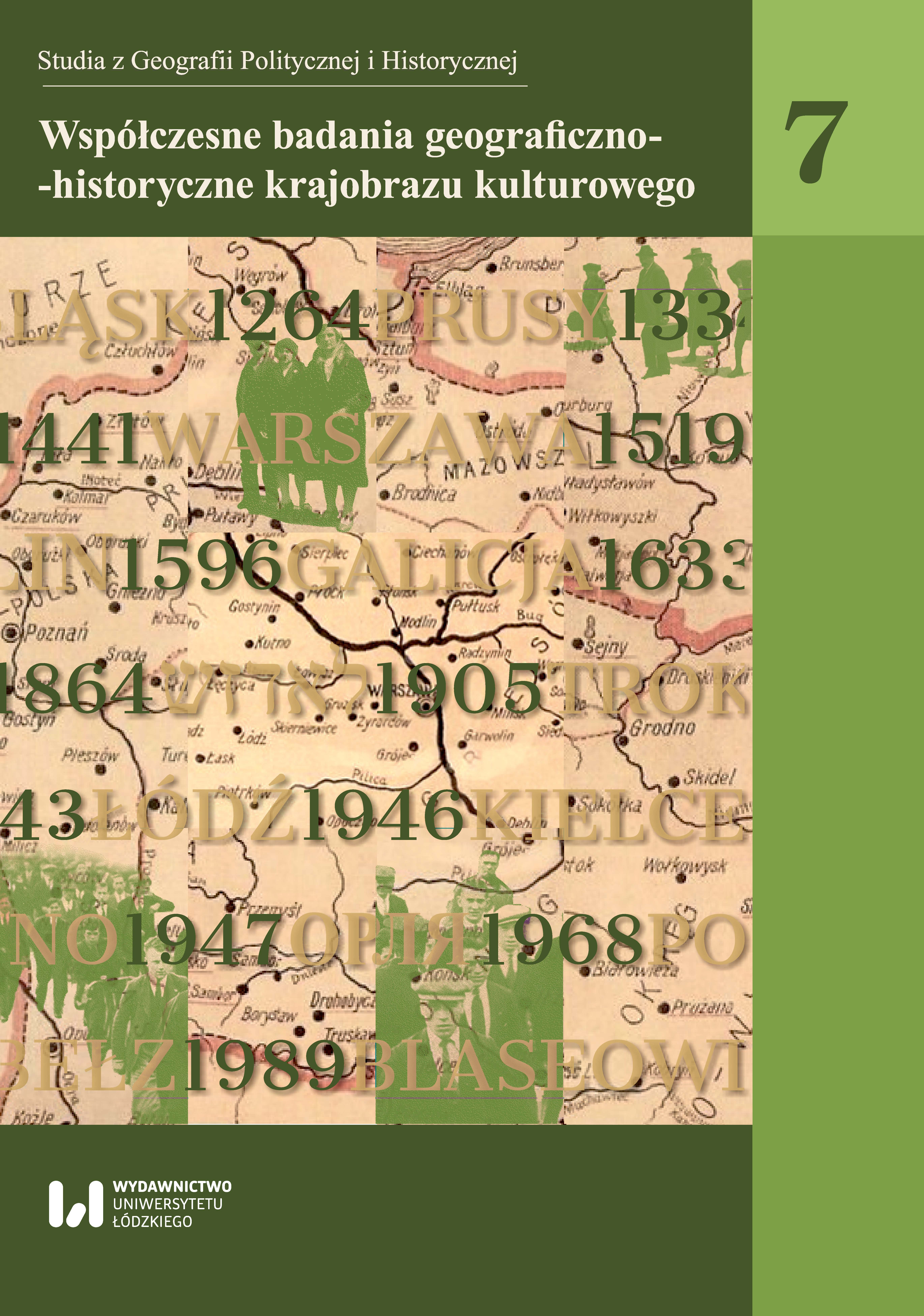O potrzebie badań nad percepcją wizualną krajobrazu kulturowego wsi
DOI:
https://doi.org/10.18778/2300-0562.07.01Słowa kluczowe:
zwrot kulturowy, zwrot ikoniczny, zwrot przestrzenny, wieś, wartościAbstrakt
W artykule omówiono wybrane kwestie związane z badaniami wizualnej percepcji krajobrazu kulturowego wsi. Autorka dokonała analizy w świetle trzech zwrotów, a mianowicie: kulturowego, ikonicznego i przestrzennego. Podkreśliła, że zdegradowane środowisko wiejskie oraz zniszczony krajobraz kulturowy są dowodem błędnych założeń teoretycznych i metodologicznych. Wskazała, że niewłaściwe wzorce planowania przestrzennego są konsekwencją braku humanistycznego spojrzenia w badaniach struktur przestrzennych. Główną osią narracji autorki stał się problem niedoboru takich wartości, jak: przywiązanie do miejsca, tradycja, szacunek dla przestrzeni w jej historycznych i geograficznych aspektach. Z refleksji tej wynika bezpośrednio, że humanistyczne podejście jest bardzo potrzebne do wdrożenia geografii z „ludzką twarzą”. Według autorki, która podziela zdanie Rogera Scrutona, ochrona wiejskiego krajobrazu kulturowego wymaga docenienia tradycyjnych wartości kulturowych. W artykule wskazano także na obserwowaną wśród młodych badaczy tendencję do umniejszania roli percepcji wizualnej. Autorka kwestionuje „kulturę detronizacji” wzroku, który jako element doświadczania przestrzeni przez człowieka w istotny sposób pomaga w walce przeciwko degradacji krajobrazu polskiej wsi.
Bibliografia
Albrow M., 1996, The Global Age, Cambridge.
Google Scholar
Angutek D., 2013, Kulturowe wymiary krajobrazu. Antropologiczne studium recepcji przyrody na prowincji: od teorii do empirii, Poznań.
Google Scholar
Bach-Głowińska J., 2014, Inteligentna przestrzeń. Trzeci wymiar innowacyjności, Warszawa.
Google Scholar
Bachmann-Medick D., 2012, Cultural turns. Nowe kierunki w naukach o kulturze, przekł. K. Krzemieniowa, Warszawa.
Google Scholar
Bator J., 2008, Wstęp. Metafory i metonimie płci, [w:] Bator J., Wieczorkiewicz A. (red.), Ucieleśnienia II. Płeć między ciałem i tekstem. Praca zbiorowa, Warszawa, s. 7–19.
Google Scholar
Bucholc M., 2012, Wstęp [do:] Maffesoli M., Rytm życia. Wariacje na temat wyobraźni ponowoczesnej, przekł. A. Karpowicz, Kraków, s. XL–XXXV.
Google Scholar
Bukraba-Rylska I., Wieruszewska M., Burdyka K., 2017, Lokalne dziedzictwo kulturowe w doświadczeniu mieszkańców wsi, Warszawa.
Google Scholar
Bohem G., Mitchell W.J.T., 2012, Zwrot obrazowy a zwrot ikoniczny: dwa listy, [w:] Bogunia-Borowska M., Sztompka P. (red.), Fotospołeczeństwo. Antologia tekstów z socjologii wizualnej, Kraków, s. 94–117.
Google Scholar
Giddens A., 2003, Stanowienie społeczeństwa. Zarys teorii strukturacji, przekł. S. Amsterdamski, Poznań.
Google Scholar
Jameson F., 1986, Postmoderne – Zur Logik der Kultur im Spät-kapitalismus, [w:] Huyssen A., Scherpe K.R. (red.), Postmoderne. Zeichen eines kulturellen Wandels, Reinbek, s. 45–102.
Google Scholar
Jeziorski I., 2013, Krawędzie doświadczenia. Studium z antropologii wizualnej i sensorycznej, Bielsko-Biała.
Google Scholar
Kowicki M., 2011, O wątpliwych i niewątpliwych pożytkach z badań naukowych na temat wsi w planowaniu przestrzennym i architekturze, [w:] Halamska M. (red.), Wieś jako przedmiot badań naukowych na początku XXI wieku, Warszawa, s. 73–87.
Google Scholar
Kossow M., 2007, Społeczne wytwarzanie przestrzeni w Starym Testamencie, „Studia Regionalne i Lokalne”, 2 (28), s. 13–26.
Google Scholar
Libura H., 1990, Percepcja przestrzeni miejskiej, seria: Rozwój Regionalny, Rozwój Lokalny, Samorząd Terytorialny, 31, Warszawa.
Google Scholar
Łukasik M., 2015, Lokalność w kontekście architektury i atmosfery, „Societas/Communitas”, 1–2 (19–20), s. 224–229.
Google Scholar
Mirzoeff N., 2012, Czym jest kultura wizualna?, [w:] Bogunia-Borowska M., Sztompka P. (red.), Fotospołeczeństwo. Antologia tekstów z socjologii wizualnej, Kraków, s. 158–192.
Google Scholar
Olsen B., 2013, W obronie rzeczy. Archeologia i ontologia przedmiotów, przekł. B. Shallcross, Warszawa.
Google Scholar
Scruton R., 2017, Zielona filozofia. Jak poważnie myśleć o naszej planecie, przeł. J. Grzegorczyk, R.P. Wierzchosławski, Poznań.
Google Scholar
Skrzypek M., 2017, Mądrość roju – czyli mechanizm rozwoju wspólnot lokalnych, [w:] Szomburg J. (red.), Polacy i Polska wobec wyzwań dojrzałości. Po XI Kongresie Obywatelskim, Gdańsk, s. 149–155.
Google Scholar
Sztompka P., 2007, Zaufanie. Fundament społeczeństwa, Kraków.
Google Scholar
Tobiasz-Lis P., 2015, Obraz wsi i rolnictwa w polskich i angielskich podręcznikach do geografii, „Studia Obszarów Wiejskich”, 40, s. 169–179.
Google Scholar
DOI: https://doi.org/10.7163/SOW.40.12
Wieruszewska M., 1991, Wieś. W poszukiwaniu całości społeczno-kulturowej, Warszawa.
Google Scholar
Wieruszewska M., 2017a, Krajobraz kulturowy wsi w percepcji wizualnej, [w:] Bukraba-Rylska I., Wieruszewska M., Burdyka K., Lokalne dziedzictwo kulturowe w doświadczeniu mieszkańców wsi, Warszawa, s. 45–80.
Google Scholar
Wieruszewska M., 2017b, The Rural Cultural Landscape in Visual Perception, [w:] Bukraba-Rylska I., Wieruszewska M., Burdyka K., Lokalne dziedzictwo kulturowe w doświadczeniu mieszkańców wsi, Warszawa, s. 219–225.
Google Scholar
Wilkin J., 2016, Instytucjonalne i kulturowe podstawy gospodarowania. Humanistyczna perspektywa ekonomii, Warszawa.
Google Scholar
Wójcik M., 2012, Geografia wsi w Polsce. Studium zmiany podstaw teoretyczno-metodologicznych, Łódź.
Google Scholar
DOI: https://doi.org/10.18778/7525-657-4
Radio Dla Ciebie, 12.10.2014 r.
Google Scholar
Pobrania
Opublikowane
Jak cytować
Numer
Dział
Licencja

Utwór dostępny jest na licencji Creative Commons Uznanie autorstwa – Użycie niekomercyjne – Bez utworów zależnych 4.0 Międzynarodowe.








